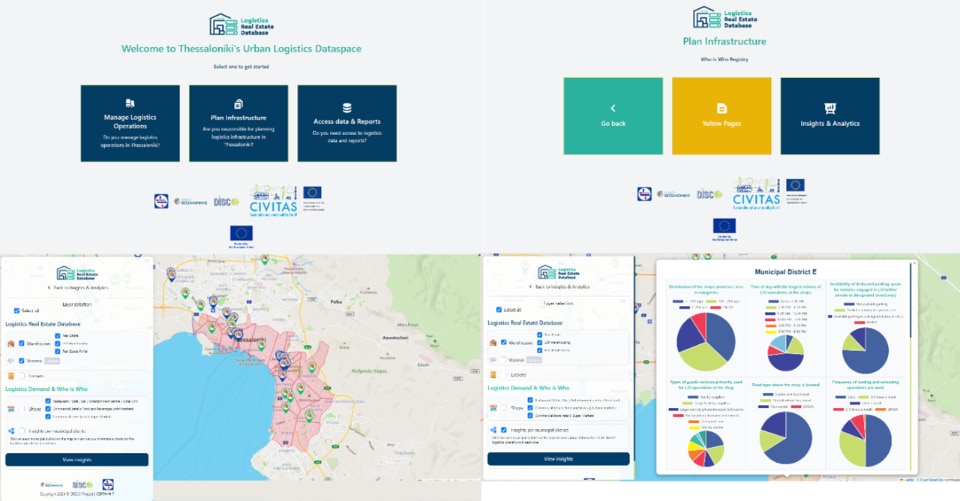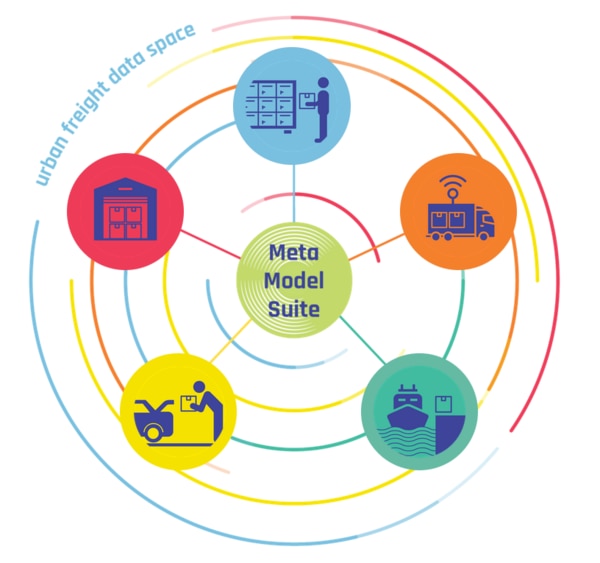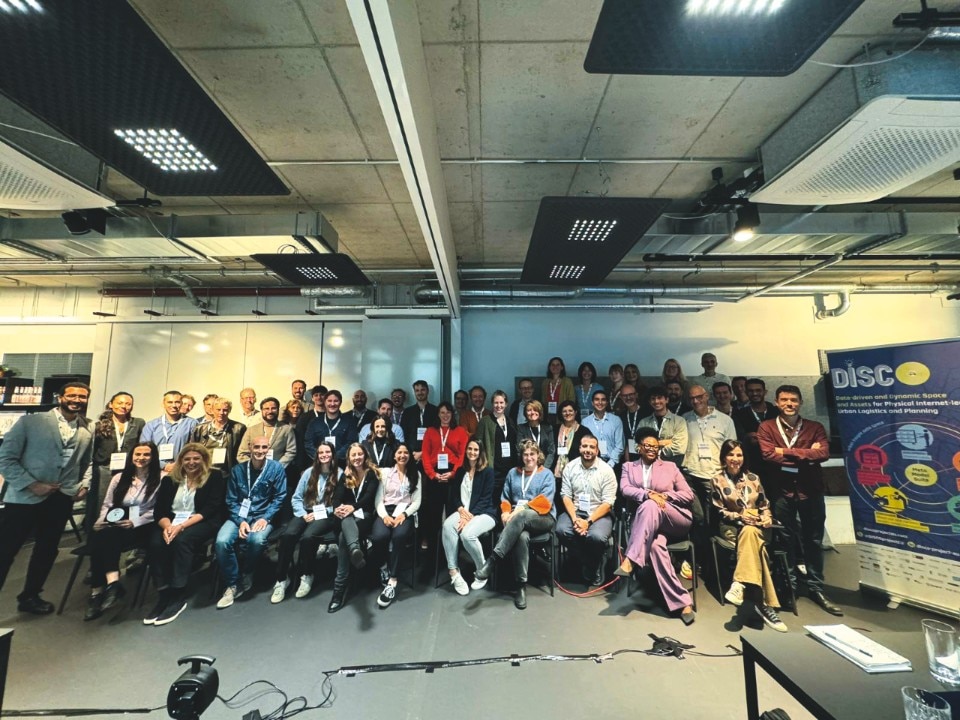In recent years, digitalization has been seen as a solution that increases the capacity and efficiency of transportation and energy systems in urban and peri-urban areas, favouring the path towards decarbonization and efficiency of logistics and freight transport. Especially in city planning, digitalization offers great opportunities to the supply chain, with particular relevance to the last mile, enabling greater and more accurate access to information, functional optimization of the use of space and other strategic assets, and the collection of data in real time for a virtuous decision-making process by planners and administrators on the basis of the principles of transparency and sharing.
This has given rise to the concept of ‘data space’, an ecosystem in which different actors share information on a voluntary and secure basis, adhering to mutually agreed rules of governance, organization, legal framework, and technical requisites. These measures ensure that participants maintain trust and control over their own data, facilitating peer-to-peer exchange. Each user in a data space maintains full control of their own information and the right to specify terms and conditions for using it.

In urban logistics, a data space is a digital environment where information necessary for logistics operations is processed and stored. Thanks to the integration of digital technologies, the data processing becomes more efficient and visible. Several european project are testing the use of data space and particularly DISCO, coordinated by FIT Consulting, is developing an urban freight data space testing applications in real world with cities and logistic operators. FIT Consulting has been a pioneer in this domain thanks to its partnership with the International Data Spaces Association (IDSA), a coalition of over 140 members (including FIT since 2023) that share the vision of a world in which companies determine the use and value of their data in a secure, trusted, and fair ecosystem.
The goal is to create an international standard for data spaces and interfaces, as well as to promote the correlated technologies and business practices that will guide the data economy of the future in all sectors. The objective is to consolidate collaboration and move towards the deployment of new models of data spaces for urban logistics. DISCO, a project co-funded by the European Commission with the Horizon Europe programme, kicked off in May 2023. The acronym (Data-driven, Integrated, Syncromodal, Collaborative and Optimised urban freight meta-model) is inspired by the evolution of the discographic industry: music was originally provided by means of physical supports but is now dematerialized and massified and accessed via a subscription to a data platform. DISCO embodies an approach that applies the same evolutionary vision to urban logistics based on digitalization, hyperconnection, and collaboration.

DISCO aims to accelerate progress towards a new paradigm of urban logistics, inspired by the Physical Internet, and to provide advanced tools for the smart, optimized, and flexible planning and use of urban spaces. The innovative solutions are currently demonstrated in eight Living Labs in European cities that plan to make dynamic use of their infrastructure and other available assets via data sharing. The Meta-Model Suite is a tool within DISCO that provides cities concrete support in the effective implementation of the measures in their Sustainable Urban Logistics Plans (SULP) and measures the degree of digital maturity and readiness to adopt solutions consistent with the Physical Internet.
DISCO thus allows cities to implement the most appropriate measures and provides the requisites for an exchange of information with the data space, which provides the missing data and the proper tools for implementing the measures. The data space has the objective of accelerating the transition process in Europe to digital, zero-emissions cities. The main challenge for the project is viewing urban logistics as a commodity. With this perspective, an urban planner can manage spaces in a dynamic, optimized manner, based on the principle of non-exclusivity, proximity, and collaboration.

Planners thus have the concrete opportunity to integrate the movement of goods into an efficient ‘network of networks’, where the assets, public or private as they may be, can be made available based on needs and capacity. DISCO solutions (DISCO-X) are designed to guide all stakeholders, including those in the real estate sector, and initiate real change, from disorderly, unmanaged development to efficient, zero-emissions, proximity delivery models, getting the goods to the final consumers. If we look at the chronology of these themes, we see that logistics has been carefully addressed in the discussions and projects about smart cities, but only recently.
Following the increase in online sales and the growing complexity of last-mile delivery networks, urban logistics has begun to emerge as a fundamental component in accomplishing both digital and ecological transition. All measures in the DISCO project contribute to supporting cities, also in the process towards new public-private governance models with shared management of data and resources. Resources are optimized and shared in DISCO among logistics operators in order to reduce the number of unnecessary trips and distances and thus environmental impact, and to enhance data[1]sharing-enabled collaboration among stakeholders. DISCO thus not only contributes to improving the efficiency of urban logistics, but also to guiding cities towards a process of sustainability in interconnected, interoperable, and integrated settings.
Interconnections with Physical Internet
The Physical Internet represents a paradigm shift in the way in which physical objects are transported, stored, delivered, and used, pursuing global efficiency and sustainability in logistics. For example, there are measures implemented in the DISCO project for the city of Helsinki, with the creation of an innovative micro-hub in an urban shopping centre where the space is shared by a number of operators. In particular, two logistics operators use the same cargo bikes to make deliveries, and DHL has set up service points for package pickup. In Thessaloniki, Greece, the largest national logistics operator, ACS, shifted a part of its storage space to the city fairgrounds near the city centre. The fairgrounds allowed the operator to use its underused spaces as a waystation for goods. A tool was developed for the purpose that links demand for space from logistics operators with those who have space to offer.
In Ghent, Belgium, an urban access control system is being implemented connected to the traffic control system. The tool plans routes for logistics operators, suggesting the best option for last-mile delivery to promote sustainable solutions and route adjustments in real time. Lastly, Copenhagen is using a Digital Twin with the participation of over twenty logistics operators, who have provided their own data for simulations of possible measures to implement, which will then be integrated into the city’s Sustainable Urban Logistics Plan.








